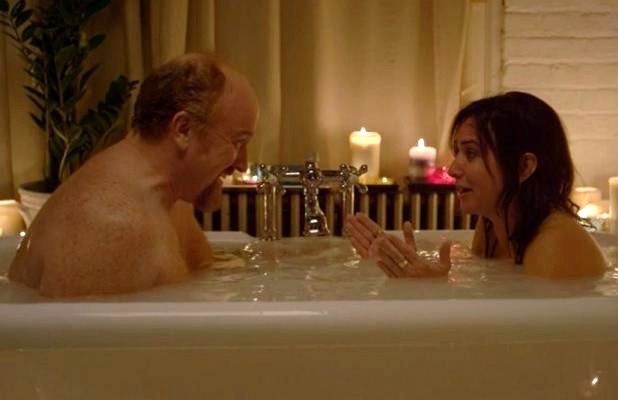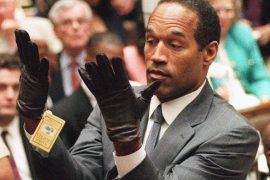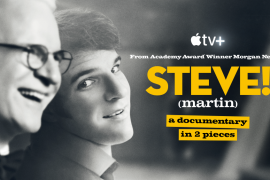 All other shows, thanks for coming out. There’s nothing else on TV like Louie.
All other shows, thanks for coming out. There’s nothing else on TV like Louie.
The FX series wrapped up for a fourth season Monday night with two more brilliant episodes, concluding a trilogy featuring co-writer and producer Pamela Adlon.
The remarkable thing about Louie this season was the daring departure from how stories were told in earlier seasons. Never conventional, the fourth season approach was liberated from any structures. Not once did an episode start this season with Louie CK climbing up the steps from the underground comedy cellar, or chomping on pizza. The “Louie Louie” theme song was scrapped in favour of a brief, one word main title card. You always knew this season would not be like the others.
Louie CK. took 19 months off between seasons and took the time to clear his head and re-think what he wanted to say. He brought in some help, huddling with fellow comic Steven Wright in plotting out this season. He broke whatever rules he hadn’t broken before, mixing the real and the surreal, serial with stand alone. At the beginning of the season, his hapless comedian character is being sued for millions of dollars for inadvertently smashing the face of a model (played by 24‘s Yvonne Strahovski). After that episode, we never hear about that again.
Instead we got long story arcs exploring the hopelessness of male/female relationships. Louie finds love with a woman who cannot speak English. He finally consummates his relationship with his mean, snarky long time girl friend (Adlon). He freaks out when his 12-year-old daughter flirts with pot, triggering a 90-minute movie exploring pre-teen angst in a brutally frank and original manner.
In many ways, Season Four of Louie was the best drama on television. It was Game of Thrones of the psyche.
advertisement
Sure it was fitfully funny, thanks in no small part to contributions from Charles Grodin as peevish doctor Bigelow (“Come back when you have a blood disease–that is my specialty.”) The casting all season long was outstanding. Jeremy Renner has never been better than he was as that seedy drug dealer in the “Into the Woods” episodes. Third Watch alumni Skip Suddith also got to shine as the teacher we all wish we’d had. Ellen Burstyn delivered her strongest performance in years as Ursula, a Hungarian neighbour Louie first encounters in an elevator. C.K later falls hard for her niece Amia (Eszter Balint). Their courtship was both harrowing and sweet. The scene in the apartment hallway where Amia and Louie’s daughter Lilly (Hadley Delany) duet on violins was astonishing and beautiful. Amia’s pantomime at the drug store made language seem like a last resort.
Beyond casting, C.K.’s most daring work was with the camera. He dared to stay with medium shots of two people for several minutes at a time. Capturing the impromptu violin recital felt as intimate as if you, the viewer, were recording it to post on Facebook. The final scene of the finale, holding on Louie and Adlon in their overflowing bathtub encounter, lasted a full five minutes. We all needed to soak in that last scene.
C.K. tended to explore the uncomfortable throughout the series but this season pushed way past awkward in going for the hard core truth. At times, the whole dark stand up comedy culture was as stripped as naked as C.K. and Adlon in that tub, with Louie’s real life comedy mates Todd Barry, Nick DiPaolo, Jim Norton and others all pulling their comedy pants way, way down. (Norton tells Louie and DiPaolo to “get a room” during a scene brimming with pettiness, jealousy and envy. Pettiness, Jealous and Envy once opened for these guys in New Jersey.)
Jerry Seinfeld’s shockingly cold self caricature in the first episode was a stunner. Compare this with Seinfeld’s episode with C.K. of Comedians in Cars Going for Coffee and you have the ying and the yang of road comedy.
The season reminded me of the extras on the Larry Sanders boxed DVD set. That’s where Garry Shandling revisits cast members to unearth some final truths from the making that landmark comedy. The encounters are real and not always pleasant, making these extras unlike the usual happy cast gatherings found as DVD extras. In particular, Shandling’s sit down with Sharon Stone is as riveting and real as you’ll ever see. Shandling is left shaken, and that feeling translates to viewers.
As brave and unflinching as that extra is, Louie CK manages to sustain that ideal–going for the raw, real and unfiltered–throughout 14 episodes of a scripted, fictional TV series. The whole season was all about getting comfortably naked, which Louie achieves by the final scene.
It is absolutely his story. CK digs into his own colourful heritage for inspiration, exploring his Hungarian/Mexican/American roots. Yet we all come from some sort of North American melting pot. Louie’s zany family tree is just as crooked as all the others.
The old flashes of anger from CK. were welcome, too, as when he savages the stupidity and repetitiveness of local newscasts. There were flashes of madness, too, especially during that freakish storm. The unconventional casting, especially in the flashbacks (CK re-uses actors in different roles and gives little heed to matching likeness or colour, a peculiarity goofed on by Adlon’s character towards the end), contributed to an overall unsettled feeling.
By the end of the season, Louie had had his heart broken, survived a hurricane, a law suit and all kinds of humiliation. Yet he’s still, tree trunk legs and all, the apple of his daughter’s eyes. He is still loved, which is all any of us really wants.
Through it all, Louie CK made us genuinely care for these people every step of the way. That’s as good as television gets.






